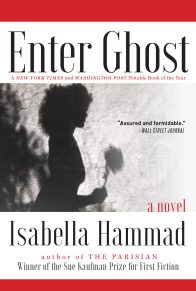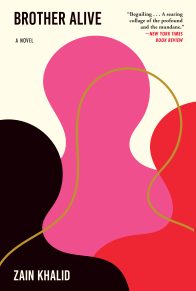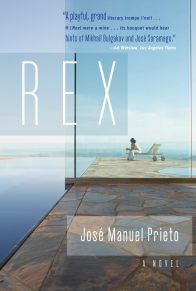“Dazzling . . . A deeply imagined historical novel with none of the usual cobwebs of the genre . . . The Parisian has an up-close immediacy and stylistic panache . . . that are all the more impressive coming from a London-born writer still in her 20s . . . Exquisite.”—New York Times Book Review
“Assured and captivating . . . Ms. Hammad’s acute evocation of place and personality ensures that we are never lost . . . This agile writer sets us firmly in place, fixing our attention on intersecting lives.”—Wall Street Journal
“Stunning . . . a lush rendering of Palestinian life a century ago under the British mandate and a sumptuous epic about the enduring nature of love.”―Vogue
“Hammad uses the features of historical novels to cut through the familiar dichotomies of West and Near East, placing her protagonist in a rich web of families, political intrigues, and cultural exchanges, and subtly reconfiguring the literary tropes of ‘home’ and ‘abroad.’”—New Yorker
“Epic . . . Because the book takes place in the complicated time and spaces that it does, the narrative grapples with sociopolitical concerns as well as it does the intimate, human ones. It sweeps you along.”—Vanity Fair
“It’s hard to believe this sweeping, sophisticated historical novel is Isabella Hammad’s debut — Hammad is truly a talent to watch.”—Refinery29
“Lavish, leisurely and immersive . . . The Parisian comes across as both old-fashioned and modern-minded . . . Ms. Hammad’s command of the broad picture and the filigree detail alike makes this paradoxical tone succeed. One of Midhat’s French friends disdains the small stuff since he ‘was an architect, not a carpenter.’ Ms Hammad knows, and triumphantly shows, that a novelist of vision must be both.”—Economist
“Remarkably accomplished . . . Hammad is a natural storyteller. She sustains tension and suspends revelation skillfully, and interweaves character and theme, the global and the local, with the assurance of a much more experienced author. The writing is deeply humane, its wide vision combined with poised restraint . . . The Parisian teems with riches – love, war, betrayal and madness – and marks the arrival of a bright new talent.”—Guardian
“One of the most ambitious first novels to have appeared in years . . . Written in soulful, searching prose, it’s a jam-packed epic… Hammad is a natural social novelist with an ear for lively dialogue as well as an ability to illuminate psychological interiority… Hammad is a writer of startling talent – and The Parisian has the rhythm of life.”—Observer
“Hammad has an exquisite control on her subject: this is precise writing, measured, and careful . . . Much of the pleasure of the book is to be found in Hammad’s often strikingly clear, original imagery . . . She also provides many canny shifts in focus, from a cinematic, establishing wide-shots of a location, deftly sketched, to zooming in on the tiniest, most intimate detail . . . It is Hammad’s sustaining of both perspectives, the minutiae that make up an individual life and the macro political upheavals that change a country forever, that makes The Parisian so impressive.”—Independent
“Isabella Hammad shows rare maturity, both in her marshaling of a huge cast of characters and in her ability to illuminate such a politically charged period of history without didacticism or literary showboating.”—Mail on Sunday
“Sumptuous and sharply observed – an old-school novel to lost yourself in.”—Metro
“A hugely accomplished historical sweep of a book . . . a novel of immense skill and confidence.”—Guardian
“In her exceptional debut, Hammad taps into the satisfying slow-burn style of classic literature with a storyline that captures both the heart and the mind . . . Richly textured prose drives the novel’s spellbinding themes of the ebb and flow of cultural connections and people who struggle with love, familial responsibilities, and personal identity. This is an immensely rewarding novel that readers will sink into and savor.”—Publishers Weekly (starred review)
“An assured debut novel . . . closely observed and elegantly written.”—Kirkus Reviews (starred review)
“The Parisian is a sublime reading experience: delicate, restrained, surpassingly intelligent, uncommonly poised and truly beautiful. It is realism in the tradition of Flaubert and Stendhal – everything that happens feels not so much imagined as ordained. That this remarkable historical epic should be the debut of a writer in her mid-twenties seems impossible, yet it’s true. Isabella Hammad is an enormous talent and her book is a wonder.”—Zadie Smith
“The Parisian is a gripping historical novel, a poignant romance, and a revelatory family epoch. Above all, it is a generous gift. There is a kind of joy that can hold not only pleasure, but struggle, and even sadness. This novel tells that kind of joyful story, and evokes that kind of joy in the reader.”—Jonathan Safran Foer
“A lushly imagined, beautifully written, expansive powerhouse of a debut. Isabella Hammad is a great new voice.”—Nathan Englander
“An exquisite, intricate and wise novel. I was utterly gripped from the first page until the last. This sweeping, historical epic marks the arrival of a wonderfully gifted author. Isabella Hammad is a marvel and The Parisian is an unforgettable read.”—Irenosen Okojie
“The Parisian is extraordinary — wise, ambitious, and lavishly rewarding. With luminous prose and rare compassion, Isabella Hammad offers her readers an absorbing story of war and identity, of love and independence, of hope and history. It’s an astonishing novel, heralding the arrival of a major talent.”—Bret Anthony Johnston
“With masterful lyricism and unflinching insight, The Parisian captures the personal passion and political violence of a nascent nation’s struggle for independence. Hammad has written a profound and intoxicating epic, brimming with unexpected, vivid imagery and unforgettable characters. Hers is a fresh voice of the first order.”—Bradford Morrow
“Isabella Hammad powerfully and beautifully evokes the times of a century ago, and the places of Nablus in Palestine, and the Paris of then, along with every other place portrayed, in a novel immersed in a period of incredible change. The pull of modernity, the cast of colonial control, the aspirations for independence and freedom, and how they play out in the life of a young man growing into all of these things. along with his own coming to age, is written with surpassing nuance and knowing. By better knowing the ‘then’ and ‘there’ of this remarkable, empathetic book, and the world it portrays, we come to better know our own here and now.”—Rick Simonson, Elliott Bay Book Company, Seattle
“Isabella Hammad’s The Parisian drops us into a world a century ago, World War I France and interwar Palestine–a world of beauty and violence, romance and intrigue, secrecy and confusion, personal memory and cultural memorial, modernity and colonialism, Eurocentrism and Orientalism. The vivid characters and their charged relationships give us a living world that both informs and is our own, concrete and complex, historic and immediate. A beautiful work of fiction set in a moment of turbulent political upheaval that continues to inform our own, The Parisian also highlights a neglected history of the Middle East and Palestine we would do well to acknowledge and remember.”—Jonathon Welch, Talking Leaves Books, Buffalo
“A sweeping, ambitious novel that completely envelops the reader from the first page, from WWI Palestine to France and back. The story of Midhat Kamal’s coming of age from his French education, his discovery of love and culture, through the lives of his extended family, political engagement, war, the struggles of a nation, love found and lost, madness—this beautiful book gives us an extraordinary portrait not only of this one man but of a place. It feels as though it was surely written by a well-seasoned writer but in fact is a debut novel by a young woman with an old soul. Like reading The English Patient or Atonement for the first time it seems destined to become a contemporary classic.”—Melanie Fleischman, Arcadia Bookstore, Glenside, PA
“A spectacular masterpiece. This sweeping saga enlightens a period of time and place that few have written about or tackled with such beautiful prose. A novel worth every moment of your time!”—Julie Slavinsky, Warwick’s, La Jolla
“The Parisian is a captivating novel of ideas that juxtaposes West European thought and world view during the early decades of the twentieth century, with that of the East. It is a story of cultural assimilation, of deprivation and sacrifice in time of war, and it is quite simply a beautifully vivid, immersive love story. While these attributes alone would make The Parisian a compelling read, it is Ms. Hammad’s writing that marks this work as one of the greatest novels that I’ve read in recent years. The descriptions are sharp and lush, and she depicts her characters’ mannerisms and thoughts in ways that feel recognizably familiar yet are expressed with a felicity for language that is altogether exceptional. This is a novel for everyone who craves a timeless love story and admires superb writing.”—Lori Feathers, Interabang Books, Dallas
“Midhat Kamal has led a rather sheltered life when he travels to France in 1914 to study medicine. He lived with his grandmother in Palestine as a young child, then went to a boarding school in Turkey. His father resided in Egypt with his second wife, visiting Midhat infrequently. Thus young Midhat finds France overwhelming and his mentor’s daughter enchanting. It will not be long before world events shape the course of Midhat’s life as Palestine falls under British rule and nationalistic fervor ignites in the people. Midhat is torn by loyalty to France, for experiences that helped shape him, and the Palestinian community that is his birthright. Complicating his choices and actions will be his love for two women, one French the other Palestinian. This immersive historical fiction will lead the reader to a greater understanding of Palestine.”—Deon Stonehouse, Sunriver Books & Music, Sunriver, OR
“A big novel in terms of history, geography and humanity, The Parisian is a remarkable achievement for a first-time novelist, one that embraces a single character, Midhat Kamal, examining his life and loves and in the process his people and their history as well. As a young man Midhat, the son of a wealthy merchant with interests in Nablus and Cairo, travels to Paris to study medicine. There he meets and falls in love with a young Parisian woman who forever changes his life. The year is 1914 and even in Paris shadows of the fate that is about to overtake the Middle East are hard to ignore. Midhat is forced to return to his home and during the ensuing years his fates is locked with that of his people as the upheaval in the Middle East under the British occupation and the changes in the political and geographic map of a part of the world—changes that impact us all today—loom ever larger. Listening to the beat of Midhat’s heart as he attempts to relate to his friends, his grandmother, his distant father, his wife and children, we bear witness to his attempt to understand his own history and that of his people. In the process of following the interior life of one memorable character who is trying to understand his own heart and destiny we learn more about the events surrounding the birth of the Middle East as it exists today than any history could impart. A monumental achievement.”—Betsy Burton, The King’s English, Salt Lake City
“Isabella Hammad’s characters are exquisite. Their relationships with one another, and within their own self-perceptions, are astute, fragile, and beautiful. Her writing effortlessly interweaves the complexities of culture and patriotism, love and communication from an Ottoman Palestinian’s studies abroad in France during WWI into the base fabric of this novel. Tremors grow underneath the surface of the woven landscape, emerging and shaking Hammad’s characters’ inner and outer worlds into new versions of themselves. The Parisian offers an important reminder about ‘west’ and ‘east,’ interlopers, the dangers and lasting impact that comes from distilling cultural complexities into a tidy representation on paper.”—Rachel Lapkin, Odyssey Bookshop, South Hadley, MA
“A richly-imagined debut novel by Plimpton Prize winner Isabella Hammad, The Parisian is an epic family saga that illuminates a crucial period of Palestinian history through the journey and romances of one young man, from his studies in France during World War I to his return to Palestine at the onset of its battle for independence.”—Linda Kass, Gramercy Books, Bexley, OH
“I loved it, and the more time I spent reading it, the more I loved it, eventually slowing my heart rate and sharpening my mind to keep up with the pace and density of this epic historical novel. Hammad strikes a surprisingly 19th century tone, reminiscent of War and Peace, or of Evgeny Onegin, from the musing, philosophical interiority of the bourgeois characters right down to the untranslated French asides and bon mots. The Parisian too is concerned with the fates and fortunes of people caught up in the rise and fall of empires — in this case, the Ottoman, British, and French. First love, class struggles, intense male friendships, and families both happy and unhappy fill the pages and the decades of this early 20th century. The writing itself is exquisitely balanced. Not one adjective or adverb is cliche, and in fact mundane images are revivified by her unusual, and perfectly apt, descriptive language. She also artfully plays with Arabic and French mixed into her English novel – the characters are varyingly bi- and trilingual, and so is the text, but it never feels like a gimmick or a ploy (I should confess to being a reader of both French and Arabic, which surely affected my perception). But if The Parisian is part of a lineage of epic historical novels, it is a rebuke to the tradition of Orientalist fiction, from Flaubert or Byron or so many others, and it rehearses arguments about ‘East’ and ‘West’ that will sound chillingly contemporary to readers today.”—Helen Zuckerman, Community Books, Brooklyn
















